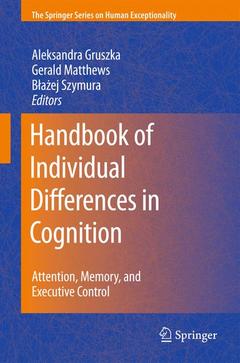L’édition demandée n’est plus disponible, nous vous proposons la dernière édition.
Handbook of Individual Differences in Cognition, 2012 Attention, Memory, and Executive Control The Springer Series on Human Exceptionality Series
Coordonnateurs : Gruszka Aleksandra, Matthews Gerald, Szymura Blazej

As cognitive models of behavior continue to evolve, the mechanics of cognitive exceptionality, with its range of individual variations in abilities and performance, remains a challenge to psychology. Reaching beyond the standard view of exceptional cognition equaling superior intelligence, the Handbook of Individual Differences in Cognition examines the latest findings from psychobiology, cognitive psychology, and neuroscience, for a comprehensive state-of-the-art volume.
Breaking down cognition in terms of attentional mechanisms, working memory, and higher-order processing, contributors discuss general models of cognition and personality. Chapter authors build on this foundation as they revisit current theory in such areas as processing effort and general arousal and examine emerging methods in individual differences research, including new data on the role of brain plasticity in cognitive function. The possibility of a unified theory of individual differences in cognitive ability and the extent to which these variables may account for real-world competencies are emphasized, and commentary chapters offer suggestions for further research priorities.
Coverage highlights include:
- The relationship between cognition and temperamental traits.
- The development of autobiographical memory.
- Anxiety and attentional control.
- The neurophysiology of gender differences in cognitive ability.
- Intelligence and cognitive control.
- Individual differences in dual task coordination.
- The effects of subclinical depression on attention, memory, and reasoning.
- Mood as a shaper of information.
Researchers, clinicians, and graduate students in psychology and cognitive sciences, including clinical psychology and neuropsychology, personality and social psychology, neuroscience, and education, will find the Handbook of Individual Differences in Cognition an expert guide to the field as it currently stands and to its agenda for the future.
Aleksandra Gruszka, Ph.D., is an Assistant Professor of Psychology at Jagiellonian University, Kraków, Poland, and a life member of Clare Hall, Cambridge University, United Kingdom. She has a particular interest in psychology of creativity and neuropsychology of Parkinson’s disease. In 2004, Dr Aleksandra Gruszka was awarded a Wellcome Travelling Fellowship by the Wellcome Trust, which enabled her to spend two years at the MRC Cognition and Brain Sciences Unit, Cambridge, United Kingdom. As a result, a number of collaborative projects with Dr. Adrian Owen were undertaken, including behavioral testing of novel psychological paradigms, functional neuroimaging studies of attentional mechanisms and clinical investigations in Parkinson’s disease using both techniques. She has published in the field of individual differences in cognition (Creativity Research Journal), and she has co-authored several books and chapters on creativity (Creativity Training, International Handbook of Creativity, Creativity’s Global Correspondents, 2002) and neuropsychology (Neuropsychology, Neuropsychologia).
Gerald Matthews, Ph.D., is Professor of Psychology at the University of Cincinnati. His research focuses on human performance, cognitive models of personality, the assessment of acute states of stress and emotion, and emotional intelligence. He has published more than 200 journal articles and book chapters on these topics. He has co-authored books on Attention and Emotion: A Clinical Perspective, Personality Traits, Human Performance: Cognition, Stress and Individual Differences and Emotional Intelligence: Science and Myth. His book on Attention and Emotion won the 1998 British Psychological Society Book Award, and the book on Emotional Intelligence was commended by the Association of American Publishers in their 2002 awards. He is also editor of Cognitive Science Perspectives on Personality and Emotion. He is the elected Secretary-Treasurer of the InternationalSociety for th
Date de parution : 02-2012
Ouvrage de 494 p.
17.8x25.4 cm
Date de parution : 04-2010
Ouvrage de 494 p.
17.8x25.4 cm



